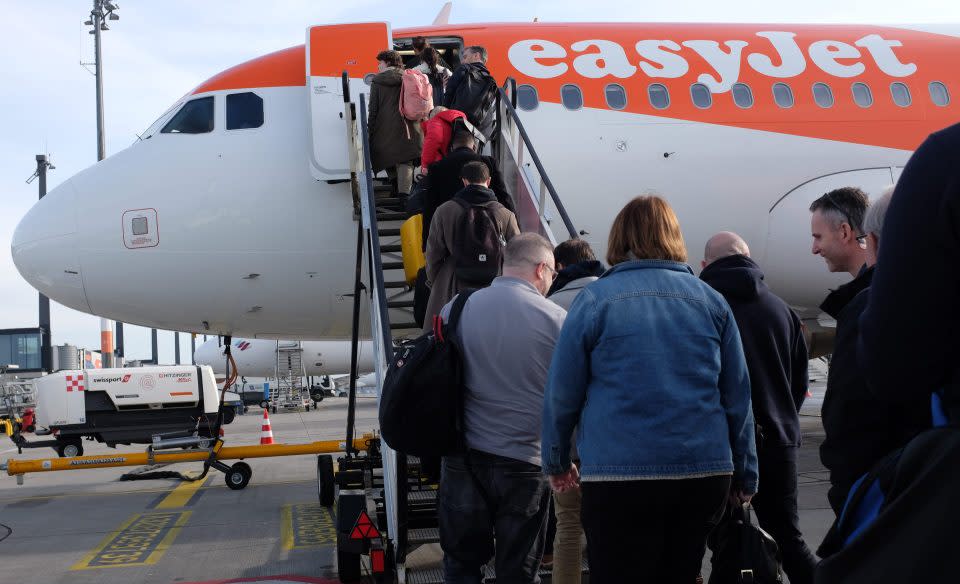Aviation results: European carriers EasyJet and Jet2 fly to new heights, while Airbus prepares to overtake Boeing as headwinds continue
It’s been a buoyant few days in the world of aviation.
As airlines and airports put the COVID-19 pandemic in the rear-view mirror, they’ve seen a significant boost in travelers over the last several months. It’s also an exciting time for the industry’s biggest players as they gear up for the critical summer season.
Elsewhere, airplane makers like Boeing and Airbus must tussle with shifting dynamics following a 737 Max jet accident that saw a panel flying off mid-air.
With a bumper week of earnings dropping, we took a look at how the travel sector’s most prominent players are faring and the outlook for the rest of 2024.
Boeing: Beating expectations, for now
Talk of Boeing’s widely publicized failures left many analysts predicting significant headwinds for the first quarter. But it beat analysts’ expectations, with a revenue of $16.6 billion, bringing losses down from $425 million to $355 million.
Still, Boeing’s problems are far from over. Its revenue dropped for the first time in seven quarters, as did its deliveries for the first three months of the year. The Seattle-based plane maker has also had massive costs looming over it, which will likely be an issue for the foreseeable months.
The 108-year-old company has had several safety problems in recent years, which prompted CEOs like United Airlines’s Scott Kirby and Ryanair’s Michael O’Leary to be vocal about their concerns with using Boeing aircraft.
But Boeing still seems confident about getting back on its feet in the near future.
“Near term, yes, we are in a tough moment,” Boeing CEO David Calhoun, who will step down as CEO at the end of this year, wrote in a memo to his employees. “Lower deliveries can be difficult for our customers and for our financials. But safety and quality must and will come above all else.”
Airbus: Preparing to overtake
The rivalry between Airbus and Boeing has amped up since the latter’s recent crisis—and it’s given Airbus the chance to widen its lead.
The European company, which is also the world’s largest aircraft maker, said on Thursday that it plans to expand its output of its A350 jets to cope with more demand. Its earnings, however, fell for the first quarter. Operating profits were lower by 25% to €577 million ($618.37 million) compared to a year earlier.
The airline is also spending a lot more this year on ramping up its production, resulting in higher costs.
On the bright side, Airbus’s deliveries for the first three months of 2024 were up 12%, pointing to the strong demand for aircraft.
"Basically we have a lot of issues," Airbus CEO Guillaume Faury told analysts on Thursday, according to Reuters. "They are all manageable but the environment is a challenging one."

EasyJet, Jet2: Flying to new highs
The excitement for summer is in the air—and EasyJet has already caught wind of it. The Pan-European low-cost carrier with British roots has seen travel demand bounce back amid bookings and higher ticket fares.
EasyJet upped its profit guidance last week after it reported better-than-expected half-year profits for the six months ending in March.
“Leisure demand has been strong as investors prioritize a week in the sun over buying other big-ticket items like sofas and TVs. It means airlines have had less disruption than other industries during the recent cost-of-living crisis,” Dan Coatsworth, investment analyst at AJ Bell, told Fortune.
Jet2, another low-cost airline, is also anticipating an exciting few months ahead—but also “more competitive” pricing. It increased its profit expectation for the year ended March by roughly 33% compared to a year earlier, seeing as packaging holiday and flight bookings were both up in the lead-up to peak travel time.
“Operationally we are well set for a successful Summer 2024 season,” Jet2 said in its earnings release Wednesday.
Elsewhere, the London-listed Hungarian budget carrier Wizz Air has also seen strong pricing in the lead-up to the summer. However, its engineering issues have pushed it to shift the expected profits for its financial year ending Mar. 31 down to the lower end of its original guidance, Wizz Air said in a trading statement Thursday. The full results are scheduled to come out in May.
Heathrow: Breaking records
The return of leisure travel has propelled Heathrow to record highs in passengers. In the first quarter, it received 18.5 million travelers—higher for a “traditionally quieter period of the year,” the group said in its results published Wednesday.
That moved the needle for Heathrow as its £60 million loss for the same period last year turned into a £189 million profit this year. The London airport also lifted its full-year expectations as it’s expecting the busy summer season.
The airport also had its first annual profit since the pandemic in 2023, pointing to an upward trajectory for Heathrow.
The path looks generally “onward-and-upward” for aviation, barring a few instances of turbulence.
This story was originally featured on Fortune.com

 Yahoo Finance
Yahoo Finance 